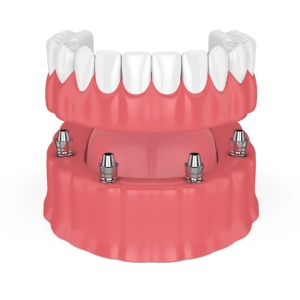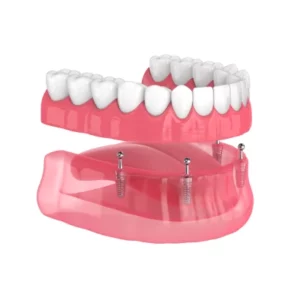While a valuable tool for replacing missing teeth, traditional dentures can sometimes come loose, slip, or cause discomfort. This can significantly impact your ability to eat, speak, and confidently smile. Denture stabilization, also known as implant-supported dentures, offers a solution to these challenges.
This blog post will delve into the process of denture stabilization, exploring the steps involved and benefits offered and helping you decide if it's the right option for you.
What are the Benefits of Denture Stabilization?
Experience a world of improved comfort and confidence with denture stabilization. Here's how it can transform your life:
- Eat with ease and enjoy a wider variety of foods. Improved chewing ability leads to better digestion and overall well-being.
- Say goodbye to discomfort and instability. Enjoy superior comfort compared to traditional dentures, allowing you to smile, speak, and laugh freely.
- Cleaning made simple. Forget messy adhesives and complicated cleaning routines. Care for stabilized dentures like natural teeth – simply brush and floss as usual.
- Reduced risk of mouth sores and infections. Securely fitting dentures minimize irritation and prevent gum problems.
- Speak with confidence and clarity. Never worry about slurred speech or embarrassing slips again. Stabilized dentures stay securely in place, enhancing your communication.
- Invest in a long-lasting solution. Denture stabilization offers a durable and reliable option for replacing missing teeth, promoting oral health and confidence for years.
Process of Denture Stabilization
Step 1: Initial Consultation
The first step in denture stabilization is an initial consultation with a qualified dentist or prosthodontist. During this appointment, the dentist will assess the patient's oral health, discuss their specific needs and goals, and determine whether denture stabilization is the right option.
This consultation is also an opportunity for the patient to ask questions, voice any concerns, and better understand what to expect throughout the process. Additionally, the dentist may take impressions or scans of the patient's mouth to aid in the customization of their dentures.
Step 2: Treatment Planning
Once the decision to proceed with denture stabilization has been made, the dentist will develop a personalized treatment plan tailored to the patient's unique needs and preferences. This plan will outline the specific steps involved in the process, as well as any associated costs and timeline for completion.
During this stage, the dentist may also discuss the various options for denture stabilization, such as implant-supported dentures or adhesive techniques. The patient and dentist will determine the most suitable approach based on bone density, oral health, and budget considerations.
Step 3: Preparing the Mouth
Before the dentures can be stabilized, preparing the patient's mouth may be necessary to ensure optimal results. This may involve tooth extractions, bone grafting, or periodontal treatment to address underlying issues and create a stable foundation for the dentures.
In cases where implant-supported dentures are used, the dentist may also need to place dental implants in the jawbone. These implants are anchors for the dentures, providing unparalleled stability and support for long-term wear.
Step 4: Fabricating the Dentures
Once the mouth has been prepared, the next step is to fabricate the dentures according to the patient's unique specifications. This process may involve taking additional impressions or scans to ensure a precise fit and natural appearance.
Depending on the chosen method of denture stabilization, the dentures may be custom-designed to attach directly to dental implants or fitted with special attachments that provide extra security and stability. The dentist will work closely with the patient to select the materials, colors, and shapes of their new smile.
Step 5: Fitting and Adjustments
With the dentures fabricated, it's time for the final fitting and adjustments. During this appointment, the dentist will ensure that the dentures fit comfortably and securely in the patient's mouth, making any necessary modifications to improve comfort and functionality.
This may involve adjusting the bite, refining the dentures' shape, or fine-tuning attachment placement for optimal stability. The dentist will also provide instructions on proper care and maintenance of the dentures to ensure longevity and optimal performance.
Step 6: Follow-Up Car
Even after the dentures have been stabilized and fitted, it's essential for patients to maintain regular follow-up appointments with their dentist. These appointments allow the dentist to monitor the health and stability of the dentures over time, making any necessary adjustments or repairs as needed.
Additionally, patients should continue to practice good oral hygiene habits and attend routine dental check-ups to prevent complications and ensure the long-term success of their denture stabilization treatment.
Get Dentures Today in Stone Mountain, GA
If you'd like to explore denture stabilization and options further, feel free to contact the team of professionals at Smoke Rise Dental in Stone Mountain, GA, for a consultation today at (678) 730-4991.
FAQs
Why do my bottom dentures come loose when I eat?
The lower denture commonly becomes loose first due to its poorer fit and unbalanced bite compared to the upper denture, which typically stays more stable.
Can lower dentures be tightened?
Regular dental visits ensure your dentures are properly adjusted and, when necessary, relined for a snug and comfortable fit.
Are there people who just can't wear dentures?
While dentures are a valuable option for many, they require proper care and use. It's important to follow your dentist's instructions, which may include removing them periodically. This is especially crucial for individuals with conditions like diabetes, as wearing dentures constantly can increase their risk of gum irritation and even minor wounds.










